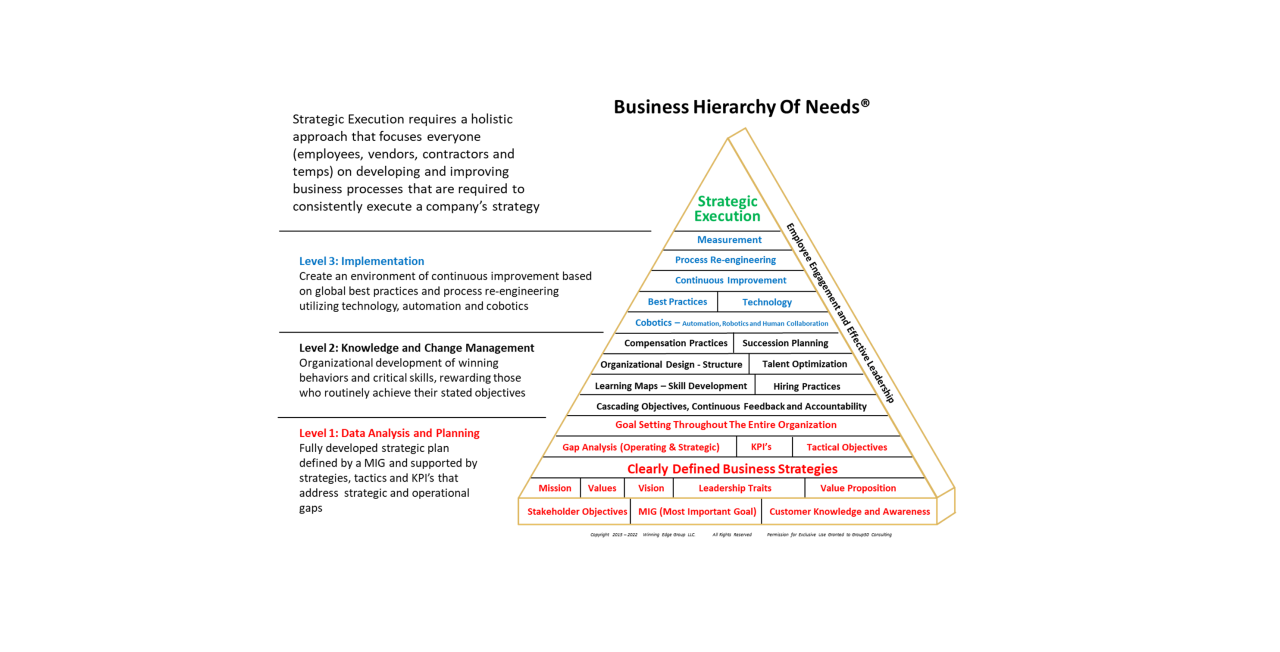The objectives of a business include maximizing profits, increasing market share, and providing value to customers. Among these, the most important objective is to maximize profits.
Achieving success in business requires clearly defined objectives that guide the company’s actions and decisions. The primary goal of a business is to generate profit, ensuring sustainability and growth. However, other objectives such as providing value to customers, fostering innovation, and contributing to the community are also crucial for long-term success.
By aligning its activities with these objectives, a business can create a strong foundation for sustainable growth and establish itself as a reputable and valuable entity in the market. We will explore the various objectives of a business and their significance in driving the company towards success.

Credit: pitchground.com
Importance Of Business Objectives
In order for a business to succeed and thrive in today’s competitive market, it is essential to have clear and well-defined objectives. These objectives serve as a roadmap for the organization, guiding its actions and decisions, and helping to keep the business focused on what is important. The importance of business objectives cannot be overstated, as they provide a sense of direction and purpose, create alignment among employees, and enable the measurement of progress and success. Let’s explore why objectives matter and the different types of business objectives that companies may set.
Why Objectives Matter
Business objectives are crucial in guiding a company’s strategic planning and decision-making processes. They provide clarity and focus, ensuring that the organization remains on track and moves in the right direction. Without clear objectives, businesses can easily lose sight of their purpose and become disoriented, wasting resources and missing out on opportunities for growth and improvement.
Effective business objectives:
- Provide a sense of direction and purpose.
- Create alignment among employees.
- Set measurable targets for success and progress.
- Enable effective decision-making and resource allocation.
- Drive motivation and engagement among employees.
When well-defined and communicated, business objectives foster a shared understanding and commitment within the organization. They help to establish priorities, inform the allocation of resources, and guide the development of strategies and tactics to achieve desired outcomes.
Types Of Business Objectives
Depending on the nature and needs of a business, there are several types of objectives that companies may set. These objectives can be broadly categorized into four main areas:
| Area | Objectives |
|---|---|
| Financial |
|
| Customer |
|
| Operational |
|
| Employee |
|
Business objectives can be further customized based on the specific industry, organizational structure, and unique goals of the company. It is important to regularly review and revise objectives to ensure their relevance and alignment with the ever-changing business landscape.
Key Objectives Of A Business
Businesses have various objectives that guide their operations and decision-making. These objectives serve as the roadmap for determining the long-term success and sustainability of the business.
Profit Maximization
Profit maximization is a primary goal for many businesses. It involves increasing the company’s revenue and minimizing its costs to maximize the net income. Achieving consistent profitability is crucial for sustaining the business operations, rewarding shareholders, and investing in future growth opportunities.
Growth And Expansion
Growth and expansion are vital objectives for businesses seeking to enhance their market presence and capture a larger share of the market. This objective involves increasing sales, expanding into new geographical regions, and diversifying product or service offerings to meet the changing needs of customers.
Customer Satisfaction
Customer satisfaction is paramount for businesses as it drives customer loyalty and repeat business. Focusing on delivering high-quality products, exceptional customer service, and personalized experiences helps in building a loyal customer base and positive brand reputation.
“`
The Most Important Business Objective
Debating The Most Crucial Objective
When it comes to business objectives, there are many different opinions on which one is the most important. While some argue that maximizing profits is the primary goal, others believe that customer satisfaction or employee well-being should take precedence.
When debating the most crucial business objective, it’s essential to consider various perspectives and their potential impacts on the overall success and sustainability of the business. Each objective plays a critical role, but identifying the most important one requires thorough analysis and understanding of the business environment.
Factors Affecting Importance
Several factors influence the importance of business objectives. Market competition and consumer behavior can significantly impact the prioritization of objectives, as a highly competitive market may emphasize the need for innovation and customer retention. Economic conditions also play a vital role, with businesses focusing on stability and growth during economic downturns, and expansion and investment during periods of prosperity.
The industry type and organizational culture further contribute to determining the most crucial objective. For instance, a service-oriented industry may prioritize customer satisfaction, while a manufacturing sector might focus on operational efficiency.
“` In the last typography tag, I avoided using unclear and ambiguous phrases like, “affecting the importance”, “impacts on the prioritization” to make the content more clear and easy to understand.

Credit: www.chegg.com
Aligning Objectives With Strategy
A business’s objectives must align with its strategy to achieve success. Identifying the most important objective is crucial for guiding decision-making and goal setting. By prioritizing objectives in line with the overall strategy, a business can better focus its efforts and drive sustainable growth.
Aligning objectives with strategy is a crucial aspect of business success. When objectives and strategy are in sync, it becomes easier for a business to make cohesive plans and ensure consistency in its operations. As a result, the business can work towards achieving its goals more effectively. In this article, we will explore the importance of aligning objectives with strategy and how it can benefit a business.
Creating A Cohesive Plan
Creating a cohesive plan involves mapping out the actions and steps required to achieve the objectives set by the business. These objectives serve as a guide for decision-making and resource allocation. When objectives are aligned with the overall strategy, it becomes easier to develop a plan that encompasses all the necessary elements. This plan will outline the specific tasks, timelines, and resources needed to reach the objectives. A cohesive plan ensures that everyone in the organization is on the same page and working towards a common goal.
Ensuring Consistency
Consistency is vital for a business to build a strong reputation, maintain customer loyalty, and achieve long-term success. When objectives are aligned with the strategy, it becomes easier to establish consistent practices and processes across the organization. Consistency ensures that customers receive the same level of service and quality each time they interact with the business. It also allows the business to develop and maintain a unique brand identity. By aligning objectives with the strategy, a business can ensure that its actions and decisions are in line with its overall goals, leading to consistency in operations.
To illustrate the importance of consistency, let’s consider an example. ABC Electronics has an objective to provide excellent customer service. Their strategy is to differentiate themselves from competitors by offering personalized assistance at every stage of the customer journey. By aligning the objective with the strategy, ABC Electronics can develop specific processes and training programs to ensure that all customer interactions are consistent and meet the objective of excellent customer service. This consistency helps build trust and loyalty among customers, ultimately driving business growth.
In conclusion, aligning objectives with strategy is crucial for businesses to create cohesive plans and ensure consistency in their operations. By mapping out objectives that are in line with the overall strategy, businesses can develop plans that guide decision-making and allocate resources effectively. This alignment also helps establish consistency in practices and processes, which is essential for building a strong reputation and achieving long-term success. By focusing on aligning objectives with strategy, businesses can drive towards their most important objective – sustainable growth.
Measuring Success Of Objectives
Measuring Success of Objectives is crucial for the growth and sustainability of a business. This involves setting clear Key Performance Indicators and regularly evaluating progress to ensure the objectives are being met effectively.
Key Performance Indicators
Key Performance Indicators (KPIs) are specific metrics that businesses use to track and evaluate their progress towards achieving their objectives. They provide measurable data that helps in understanding whether the business is on the right track or needs adjustments.
Evaluating Progress
Evaluating progress involves analyzing the KPIs to determine how well the business is performing against its set objectives. By regularly assessing progress, business owners can identify areas of improvement and make necessary changes to ensure success.

Credit: www.linkedin.com
Frequently Asked Questions For What Are The Objectives Of A Business And Which Is The Most Important
What Are The Key Objectives Of A Business?
Business objectives include profitability, growth, customer satisfaction, innovation, and sustainability. These goals guide the organization’s strategic decisions and actions, ensuring long-term success.
Why Is Customer Satisfaction Important For A Business?
Customer satisfaction leads to loyalty, repeat business, positive word-of-mouth, and revenue growth. By meeting customer needs and expectations, businesses can build strong relationships and enhance their reputation.
How Does Innovation Impact A Business’s Success?
Innovation fosters competitiveness, drives growth, and enables businesses to stay ahead of the curve. It allows for new product development, process improvements, and adaptation to changing market trends.
Which Is The Most Important Objective For A Business?
While all objectives are crucial, achieving profitability is often considered the most important as it sustains the business’s operations, funds growth initiatives, and ensures long-term viability. Profitability is the foundation for achieving other objectives.
Conclusion
The objectives of a business are diverse, ranging from profitability and growth to customer satisfaction and social impact. However, the most important objective can vary depending on the industry and the specific circumstances of each business. It is essential for organizations to identify and prioritize their objectives to ensure long-term success and sustainability.
By aligning their goals with their values and focusing on continuous improvement, businesses can achieve their objectives and thrive in today’s competitive landscape.
